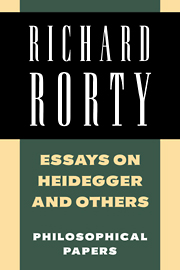Book contents
- Frontmatter
- Contents
- Acknowledgments
- Introduction: Pragmatism and post-Nietzschean philosophy
- Part I
- Part II
- Part III
- Freud and moral reflection
- Habermas and Lyotard on postmodernity
- Unger, Castoriadis, and the romance of a national future
- Moral identity and private autonomy: The case of Foucault
- Index of names
Freud and moral reflection
Published online by Cambridge University Press: 14 January 2010
- Frontmatter
- Contents
- Acknowledgments
- Introduction: Pragmatism and post-Nietzschean philosophy
- Part I
- Part II
- Part III
- Freud and moral reflection
- Habermas and Lyotard on postmodernity
- Unger, Castoriadis, and the romance of a national future
- Moral identity and private autonomy: The case of Foucault
- Index of names
Summary
The mechanical mind: Hume and Freud
Freud thought of himself as part of the same “decentering” movement of thought to which Copernicus and Darwin belonged. In a famous passage, he says that psychoanalysis “seeks to prove to the ego that it is not even master in its own house, but must content itself with scanty information of what is going on unconsciously in its mind.” He compares this with the realization that “our earth was not the centre of the universe but only a tiny fragment of a cosmic system of scarcely imaginable vastness” and with the discovery, by Darwin, of our “ineradicable animal nature.”
Copernicus, Darwin, and Freud do have something important in common, but Freud does not give us a clear idea of what that is. It is not evident that successive decenterings add up to a history of humiliation; Copernicus and Darwin might claim that by making God and the angels less plausible, they have left human beings on top of the heap. The suggestion that we have discovered, humiliatingly, that humanity is less important than we had thought is not perspicuous. For it is not clear what “importance” can mean in this context. Further, the claim that psychoanalysis has shown that the ego is not master in its own house is unhelpful, for the relevant sense of “mastery” is unclear. Does our sense of our importance, or our capacity for self-control, really depend on the belief that we are transparent to ourselves? Why should the discovery of the unconscious add humiliation to the discovery of the passions?
- Type
- Chapter
- Information
- Essays on Heidegger and OthersPhilosophical Papers, pp. 143 - 163Publisher: Cambridge University PressPrint publication year: 1991
- 9
- Cited by

